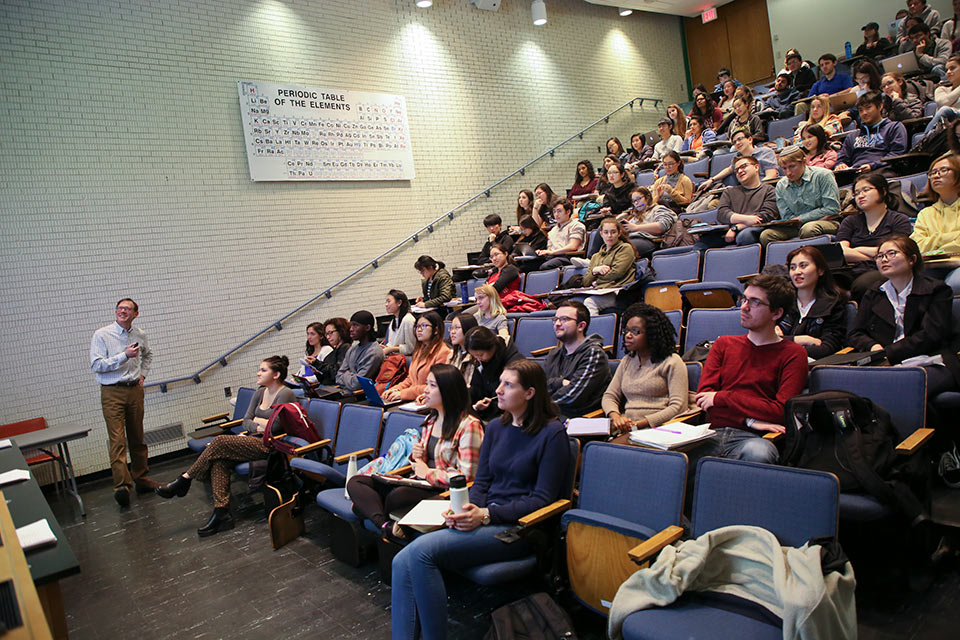Major and Minor Requirements
Students may earn a degree in HSSP as a bachelor of arts (BA), a bachelor of science (BS), or a Minor.

Professor James Morris
By undertaking this broad, interdisciplinary study of health, students prepare themselves for a variety of educational and professional opportunities. HSSP graduates pursue careers in medicine, dentistry, public health, clinical therapy, social work, genetic counseling, biomedical research, law, social policy, and public service, among many others.
All HSSP Majors and Minors must complete four Core Courses. HSSP majors must complete two additional Core Courses. The elective requirements vary depending on whether you elect to pursue a BA, BS, or a Minor in HSSP
The Four Core HSSP Courses for all Majors/Minors
- Science: For BA & Minors: BIOL 14a - Genetics & Genomics, BIOL 15b - Cells & Organisms, BIOL 16a - Evolution & Biodiversity, or BIOL 42a - Physiology.
BS students must complete the introductory 'biology sequence' (Biol 14a, 15b, and 16a) with accompanying labs (BS majors who are also majoring in Biology must complete Biol 18a and Biol 18b. BS majors without an additional major in Biology must complete Biol 12a and 12b), as well as BIOL 42a - Physiology. The prerequisites for BIOL 42a are BIOL 14a and BIOL 15b.
- Society: SOC 84a - Health, Community & Society or SOC 83a - Sociology of the Body & Health.
- Policy: HS 104b - American Health Care or LGLS 114a - American Health Care: Law & Policy
HS 104b and LGLS 114a are usually offered in the Fall each year.
- Epidemiology & Biostatistics: HSSP 100b - Introduction to Epidemiology, Biostatistics & Population Health, open to HSSP Juniors & Seniors, usually offered in two sections (section 1 for BS students and section 2 for BA students) during both fall and spring semesters. Alternatively, students may take DIS Study Abroad - Epidemiology: Danish Case Studies or Epidemiology: Swedish Case Studies
Additional Core Courses for HSSP Majors
- HSSP Senior Capstone: HSSP 110a - Integrative Seminar on Health.
Two sections offered in both fall and spring semesters, the Senior Capstone is open to HSSP seniors.
- Hands-on Experience: Your 'HOE' must be health-related.
- You can find a range of useful information on our HOE pages and in our FAQs about HSSP.
- If you have questions about the Hands-On Experience requirement, review the information online or contact Professor Darren Zinner, HSSP internship instructor.
Foundational Literacies for all Majors:
- Writing intensive (WI): Any WI-designated course approved for the major. Alternatively, any WI-designated course from BIOL, PSYC, or other program in the Division of Social Sciences.
- Oral communication (OC): HSSP 110a (Integrative Seminar in Health), the required capstone course, or any OC-designated course approved for the major.
- Digital literacy (DL): HSSP 100b (Introduction to Epidemiology, Biostatistics, and Population Health).
Electives by Degree
BA
In addition to the six Core Courses for majors: four HSSP electives (one from each Focal Area + a fourth from any Focal Area)
BS
To complete a Bachelor of Science (BS)
1. If you are also majoring in Biology, you must complete 70 credits, including the introductory biology sequence and accompanying labs (BIOL 14a + BIOL 18a; BIOL 15b + BIOL 18b; and also BIO 16a), 3 HSSP electives + 16 credits worth of Additional Basic Science* courses)
2. As of Fall 2025, if you are not majoring in Biology, you must complete 66 credits, including the introductory biology sequence and accompanying labs (BIOL 14a + BIOL 12a; BIOL 15b + BIOL 12b; and also BIO 16a), 3 HSSP electives + 16 credits worth of Additional Basic Science* courses)
*Additional Basic Science Courses = any BIOL, BCHM, CBIO, NBIO, CHEM, PHYS, MATH, COSI course at or above the 10-level or PSYC 51a – Statistics, ENGR 11a – Introduction to Design Methodology, or ENGR 22b Engineerng a Circular Economy or Econ 83a – Statistics for Economic Analysis Note: NPSY courses do not count for ABS
Minor
In addition to the four Core Courses: two HSSP electives: (one elective from one of the three focal areas + one elective from another of the three focal areas)
Student Experience

“Being at the university has given me the opportunity to pursue my intellectual curiosity. I am currently double majoring in International and Global Studies and Health: Science, Society and Policy and double minoring in Legal Studies and English. The classes within these majors and minors have taught me about such unique and interesting topics.”